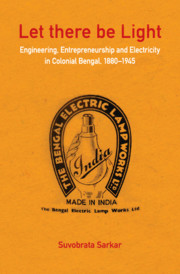Book contents
- Frontmatter
- Contents
- List of Figures
- Preface
- Acknowledgements
- List of Abbreviations
- Introduction
- 1 Technical Knowledge and Its Institutes
- 2 Entrepreneurship, Industry and Technology
- 3 Electrification: The Shaping of a Technology
- 4 Domesticating Electricity
- 5 Assimilation of Technological Ideas
- Conclusion
- Bibliography
- Index
1 - Technical Knowledge and Its Institutes
Published online by Cambridge University Press: 30 April 2020
- Frontmatter
- Contents
- List of Figures
- Preface
- Acknowledgements
- List of Abbreviations
- Introduction
- 1 Technical Knowledge and Its Institutes
- 2 Entrepreneurship, Industry and Technology
- 3 Electrification: The Shaping of a Technology
- 4 Domesticating Electricity
- 5 Assimilation of Technological Ideas
- Conclusion
- Bibliography
- Index
Summary
I may be privileged to say a word on the microscopes turned out of your workshops. I tested them and found them in design and execution as good as anything I have used manufactured by British and German makers. The increase of pupils and the extension of the Research Laboratory of the National Medical College of India in the departments of Physiology and Bacteriology have made it incumbent on us to add to the microscopes and other instruments. We were thinking of indenting these from Germany but what I saw last night has inspired me with the hope that we might be able to satisfy our wants nearer home. Your boys have inaugurated a new era in the production of scientific instruments in India and I see no reason why we should not be a self-sufficing nation even in regard to these delicate instruments.
—Dr S. K. Mallik, M.D., C.M. (Edin.), Dean of the National Medical College, Calcutta, to Satish Chandra Mukherjee, Principal of the Bengal National College (1909)Presiding over the annual prize-giving of the Bengal Engineering College at Shibpur, Howrah, yesterday afternoon, the Hon. Khan Bahadur M. Azizul Haque, Minister of Education, said that India's resources had not yet been fully trapped, and it would be the task of student engineers of to-day to realize those untapped resources for the good and betterment of this country. The Hon. Minister pointed out that though in the past former students of the college had done excellent work in later life, modern India would make even greater demands than had been made in the past.
— ‘Great Demand for Engineers: Minister's Speech’, annual prize-giving at Shibpur College (1936)Institutional history is an emerging field within the broader – and yet nascent – field of the history of technology. This chapter elucidates the history of Bengal Engineering College, Sibpur, and the College of Engineering and Technology, Jadavpur. A brief account of the history of the two higher educational institutions will illustrate the complexity of the issues involved in the progress of technical education during the period 1880–1945.
- Type
- Chapter
- Information
- Let there be LightEngineering, Entrepreneurship and Electricity in Colonial Bengal, 1880–1945, pp. 29 - 77Publisher: Cambridge University PressPrint publication year: 2020



